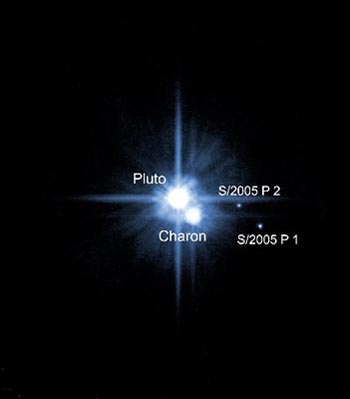| Tools: Save | Print | E-mail | Most Read |
| Pluto Demoted After Definition of Planet |
| Adjust font size: |
After days of fierce debate at the IAU conference in Prague, the very concept of a planet was re-defined, casting planetary runt, Pluto, out into spatial wilderness. According to the new rules defining a planet, Pluto does not make the grade since a planet's official definition consists of: "a celestial body that is in orbit around the sun, has sufficient mass for its self-gravity to overcome rigid body forces so that it assumes a ... nearly round shape, and has cleared the neighborhood around its orbit." Pluto is automatically disqualified because its oblong orbit overlaps with Neptune's. Instead, it was defined as a "dwarf planet", but no longer a planet. In deference to Pluto, whom millions of school-children worldwide have been to taught to regard as the 9th planet, the new category will also be referred to as "plutons." Ron Eckers, President of the IAU, the world's largest astronomical society, said it may not matter that much how many planets there are in the solar system. "What really matters is that we have a definition of planet, and with that, we are able to move on with our studies," he told Xinhua. The definition, which Ecker described as "carefully refined" with much compromise after considerable discussion, came in line with contemporary observation that has been changing the understanding of planetary systems. According to the resolution, Pluto, Charon, Ceres and 2003 UB313 are termed "dwarf planets" or "plutons" despite having enough mass and being nearly round to be considered full planets. Still, Ecker, who is strongly in favor of naming the eight planets found before 1900 "classical planets", and bringing "dwarf planets" into the category of "planets", called the result "a pity." If a larger category of "planet" is created, we can leave open the possibility of discovering and defining other types of planets, he said. Fang Cheng, an astronomer with the Chinese Academy of Sciences, also vice chairman of the IAU, told Xinhua that the definition is "clear and compact." Patricia Tombaugh, 94, the widow of American astronomer Clyde Tombaugh who discovered and put Pluto on the astral map 76 years ago, told Reuters by phone that his husband would have accepted its demotion, though she felt a little sad at the news. According to The Beijing News, Beijing Planetarium director Zhu Jin revealed that most Chinese astronomers present at the IAU conference, including himself, agreed that Pluto no longer belonged to the circle of planets. "I think some people might be affected by the long-established conception of a 9-planet solar system. But most of the people consider their votes from a large-scale and rational angle. They want to present a result which will be accepted by common people, and can sum up these new astronomical discoveries." He believes that Chinese textbooks and other related books, exhibitions and materials will be updated more often in the future, following the new definition.
(Xinhua News Agency, China.org.cn August 25, 2006) |
| Tools: Save | Print | E-mail | Most Read |
 |
| Related Stories |
|
| Product Directory China Search |
Country Search Hot Buys |

